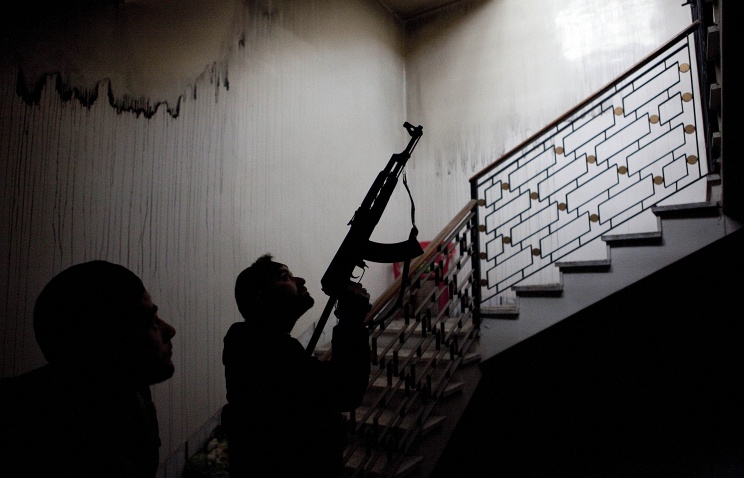
As Tajikistan Reports Foiling a Terrorist Plot, the Severity of Threat It Faces Appears Exaggerated
Publication: Eurasia Daily Monitor Volume: 11 Issue: 199
By:

On October 18, police in Tajikistan announced that they had arrested 13 members of a terrorist group who had allegedly plotted to attack a military unit, seize weapons, and blow up two major tunnels linking the country’s north with the rest of the republic. According to police, the arrested individuals had received military training in Syria and were members of Jundullah, a group linked with the Islamic Movement of Uzbekistan (IMU). Law enforcement alleged that one of the arrested individuals, Mansur Boboyorov, had served as Jundullah’s “amir” in Russia’s Sverdlovsk region, recruiting members from among tens of thousands of disillusioned Central Asian migrant workers there and helping them join jihadist rebel groups in Syria. After committing terrorist attacks in Tajikistan, the men purportedly planned to travel to Syria (avesta.tj, October 18; ozodi.org, October 19).
It is notable that the announcement came roughly four months before the parliamentary elections in Tajikistan, due in February 2015. In the run up to presidential elections last year, the authorities also reported arresting a sizable group of terrorism suspects. In September 2013, security services detained ten alleged members of the IMU and the banned Islamist group Jamaat Ansarullah, claiming that the men plotted to blow up a number of government buildings in Dushanbe as well as major roads leading to the city in order to “destabilize” the country ahead of the election day (news.tj, September 21, 2013; ozodi.org, September 25, 2013).
These were not the only cases when official reports about major arrests of purported terrorists coincided with important political events in Tajikistan. Several analysts have suggested that the authorities deliberately stir up public fear of militant and religious groups with a subversive agenda to justify repressive measures against political opposition and independent Islamic groups (see EDM, April 29). The “confessions” of alleged terrorists, which are most likely extorted through torture, are frequently broadcast on state-run television channels, followed by tacit claims of foreign support for groups seeking to destabilize Tajikistan.
The country’s officials are also always happy to talk about their successes in foiling terrorist plots at international fora, emphasizing Tajikistan’s vulnerability to Islamist militancy after the bulk of the International Security Assistance Force (ISAF) withdraws from neighboring Afghanistan by the end of 2014. For instance, in early September, Tajikistan’s Minister of Internal Affairs Ramazon Rakhimzoda claimed at a summit in Bishkek, Kyrgyzstan, that during the first half of 2014, the security services arrested 30 members of terrorist and extremist groups. He also warned that Central Asian countries might face a serious threat from Afghanistan-based militants after 2014 (RIA Novosti, September 8). Local and international media readily pick up such stories, amplifying them and making them appear credible.
Given the tendency of Tajikistan’s officials and journalists to misrepresent or exaggerate the threat emanating from extremist and militant groups, it is difficult to assess the actual severity of the threat that these groups pose to the country. On the one hand, there is an increasing amount of evidence that Tajikistani nationals do join terrorist organizations and fight alongside Islamist-inspired militant groups in Afghanistan, Syria, and elsewhere. Furthermore, Russian authorities have arrested several citizens of Tajikistan for allegedly plotting to commit terrorist attacks, disseminating Islamist ideas and calling on migrant workers to join radical groups (vesti.ru, October 17, 2013; ozodi.org, April 4, 2014). And media have identified several communities from where Tajikistani citizens traveled to Syria, mostly via Russia, to join Islamist insurgents, notably the Islamic State (formerly known as the Islamic State of Iraq and Syria, ISIS) (BBC Russian, October 18). In August 2014, the Islamic State appointed a citizen of Tajikistan as the “amir” of a large Syrian province controlled by the militant group (ozodi.org, August 27).
These facts lend some credibility to the claims that more than 200 Tajikistanis currently fight against Bashar al-Assad’s regime in Syria, many of them as part of the Islamic state organization. The claim was first made by President Emomali Rahmon and then repeated on a number of occasions by Interior Minister Rakhimzoda. The internal ministry head recently estimated that some 50 Tajikistani nationals had been killed while fighting in Syria (ozodi.org, October 15).
On the other hand, it is not clear to what extent Tajikistan’s citizens fighting in Syria or other distant places are willing or plotting to take that battle back to their native country. The heretofore absence of major terrorist attacks in this Central Asian republic, which is particularly surprising given the institutional and technical weaknesses of its security sector, suggests that militants with a Tajikistani passport have not yet identified Tajikistan as their primary target. Hence, while the terrorist threat facing the country might be entirely plausible, the severity and urgency of the threat, for now, appears exaggerated by the authorities.




